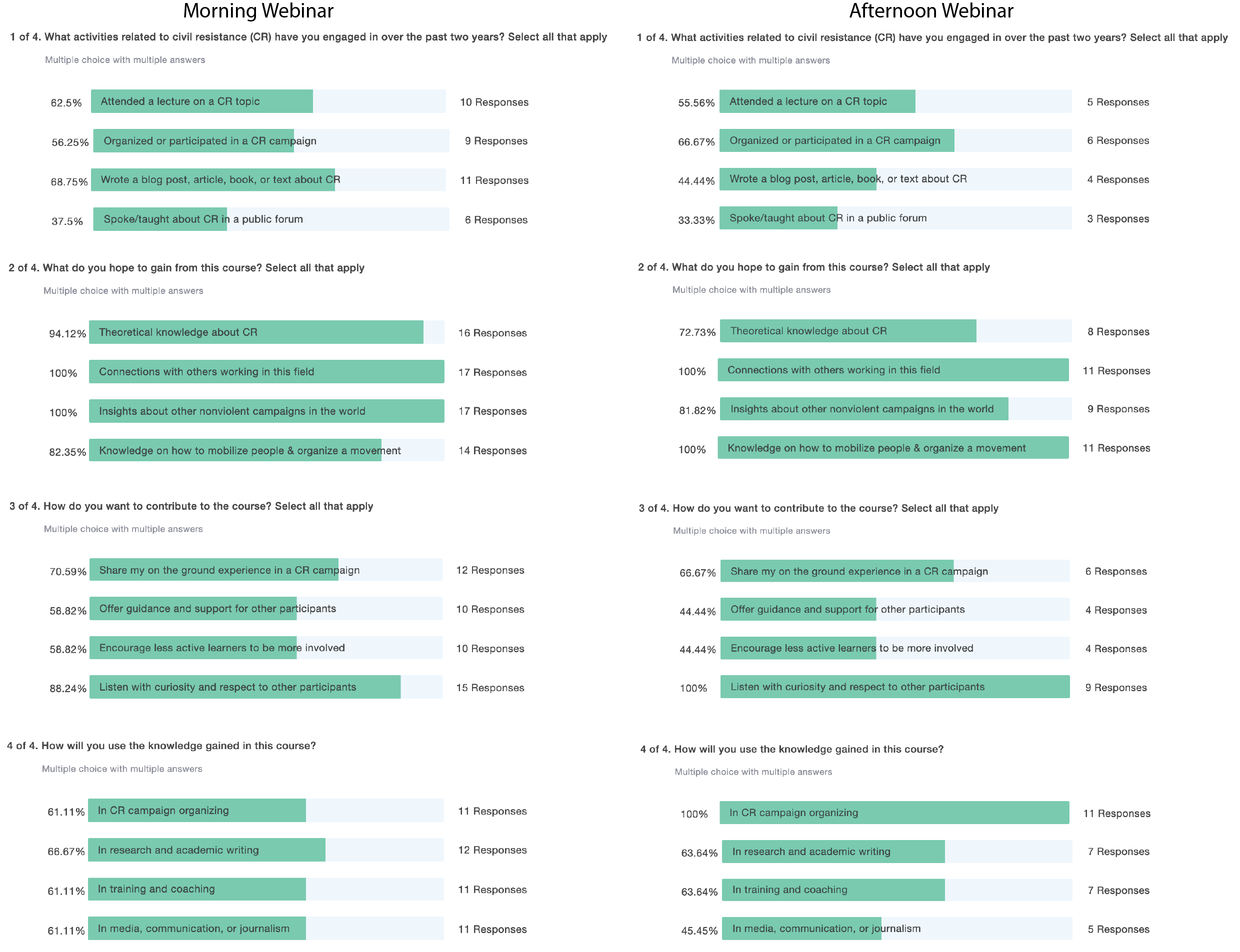2021 Participant-Led Online Course Assessment
 For the fifth year, ICNC offered our popular participant-led online course: “Civil Resistance Struggles: How Ordinary People Win Rights, Freedom, and Justice” from March 4 to April 20, 2021.
For the fifth year, ICNC offered our popular participant-led online course: “Civil Resistance Struggles: How Ordinary People Win Rights, Freedom, and Justice” from March 4 to April 20, 2021.
Read more about the 2021 course and review the assessments below.
You can also view assessments from previous courses in 2020, 2019, 2018 and 2016-17.
Applications, Admission and Course Participants
ICNC received 70 applications for the participant-led online course. The quality of applications was high and it took several rounds of reviews to select the 45 participants who were invited to take part in the online course.
Before the course began, ICNC hosted two orientation webinars for course participants. Each orientation webinar contained survey questions asking participants what they hoped to gain from the course.
In summary, participants indicated that they wanted to:
- gain practical knowledge on how to organize civil resistance campaigns more effectively,
- learn about general dynamics, concepts and cases of civil resistance, and
- share their own personal experiences with others in the course.
Course Structure & Content
Due the nature of the participant-led course, ICNC did not provide live moderation. However, ICNC staff provided:
- Comprehensive curriculum on civil resistance, meaningful videos and readings, discussion forums, group exercises, and resources for further learning
- Technical support
- Course announcements & updates

One of the unique features in the participant-led course was a self-learning community. Participants in the course built this community based on the following four principles:
- Active participation via careful content review & engagement in the forums and small group work
- Respect for different views and collaborative dialog
- Educating each other via constructive feedback, sharing relevant information, stories, and ideas
- Mutual assistance: checking on your colleagues that lag behind and are silent, offering help where needed
Course participants also had access to the ICNC Mobile App, which is available on iOS and Android. By using the app, participants could download the course content and access it offline when they were traveling or if they were in areas with low internet access.
Through rigorous learning evaluations and and participant feedback, ICNC is able to make improvements in each iteration of the course. Further, with the growing body of research on civil resistance—including ICNC’s ever-growing Resource Library—we regularly update the course content to reflect the most cutting-edge knowledge in the field. The revised 2021 participant-led course included the following modules:
Module 1. Introduction to the Course
In the welcome module, we laid out the objectives of the course. We discussed course activities, including forum posts, recorded webinars, readings, videos, webinar meetings and online discussions. We provided online learning tips to help participants make the most of the online learning experience. Finally, we introduced participants to the People Power Game: A Strategic Game About Civil Resistance, a video simulation that participants play throughout the course, during which the player takes on the role of a strategic planner for a nonviolent movement.
Module 2. Foundations of Civil Resistance
In this session we laid the theoretical groundwork out of which this field has grown, digging into both data and the big picture. Virtually every day, somewhere in the world, there are people engaging in civil resistance. But what do we mean by this term? Do we all understand it the same way? How is civil resistance defined and spoken about in participants’ towns, communities, regions or countries? In this session we clarified the concept of civil resistance, looking into power that underlies people’s actions and considering the track record of civil resistance over the past 110 years, including the reasons behind its effectiveness. This module aimed to equip participants with data to share with others in their networks about the effectiveness of civil resistance, and to enable them to articulate what civil resistance is in a clear and concise manner.
Module 3. Historical Cases of Civil Resistance Around the World, 1765–2017
In this session, we looked at specific cases of civil resistance in the last few hundred years from around the world focused on a wide variety of social change goals. Though civil resistance has been a prominent force for change for centuries, the majority of successful campaigns throughout history have been forgotten and there is a common feeling that nonviolent action is an ineffective tool. This deeply engrained bias and historical amnesia actually weakens people’s potential to improve their societies. The more we know about the history of civil resistance struggles, the more our imaginations and creativity will be free to engage in and understand effective and strategic movement building. By looking at these cases, participants learned to identify and describe a larger repertoire of specific civil resistance tactics that people have invented around the world to win rights, freedom, and justice.
Module 4. Strategies and Tactics of Nonviolent Struggle
In this session, participants looked at what strategy in civil resistance is, and how it relates to tactics. We examined examples of different tactics, including cultural resistance tactics, and discuss tactical innovation, including strategic sequencing of tactics that enhance the effectiveness of nonviolent methods and campaigns. Finally, we explored different conflict analysis tools that help movements systematically assess and analyze the battlefield in which they are engaging nonviolently.
Module 5. Repression, Backfire, and Defections
In this session, we started with a discussion about repressive contexts in which nonviolent resistance movements take place, and the phenomenon of backfire when violence against unarmed activists boomerangs back to those who carried out the repression. We explored how civil resistance movements can optimize the impact of backfire and use it to their advantage. How does the side that uses repression aim to hinder potential backfire? We then discussed defections that often, though not always, occur as a result of the backfire effect. This module focused on understanding defections from one group — security forces — and explores conditions under which the defections might happen. It also explored how regimes often try to mitigate the likelihood of security defections, and strategies that movements might deploy to increase chances of loyalty shifts among security forces.
Module 6. Violent Flanks, Agent Provocateurs, and Maintaining Nonviolent Discipline
In this session, we looked at how movement violence—whether real or perceived—can backfire against our movements and make them smaller, weaker, and less effective. We first explored the negative impacts that are most likely when sincere activists organize “violent flanks” to achieve the same goals as a civil resistance movement, or when civil resisters choose to engage in violent activities alongside of their nonviolent actions. In addition, we took a detailed look at how power elites routinely use undercover “agent provocateurs” (an anglicized French term for “inciting agents”) to increase both the real or perceived violent flank activity within our movements to make our movements easier to defeat. Finally, we explored several methods for increasing the nonviolent discipline of our movements in order to increase their effectiveness and chances of victory.
Module 7. New Frontiers in Civil Resistance Studies
In this session, we focused on a variety of important topics in the study and practice of civil resistance that have been selected for their emergence as key topics in the current field of study. By including such topics as challenging abuses by corporations, political democratization after civil resistance campaigns succeed against authoritarian rule, the role of faith communities in civil resistance, and the role of cultural resistance through the use of arts, music, and local traditions, we aim to improve knowledge about these often lesser-recognized, yet incredibly important aspects of civil resistance.
Module 8. Finishing the Course
In the last three days of this online course we solicited participants’ views about the course and their learning experience. We asked about their learning progress, overall educational experience, assessment of the course content, interactions in the forums, and their personal engagement during the seven-week period. This feedback has allowed us to improve our future online courses and make our teaching pedagogy on civil resistance more effective and more impactful on all learners involved.
Learning Gains Survey Results
At the beginning and end of course, participants were asked to take a survey measuring their knowledge about civil resistance. These surveys contained the same questions, in order to demonstrate the extent of the knowledge that they gained during the course.
the same questions, in order to demonstrate the extent of the knowledge that they gained during the course.
22 participants completed both the pre-course and post-course survey and selected graphs from their comparative results are shown below.
Click on the links below to navigate directly to each section.
I. Civil Resistance Skills
II. Applicability & Relevance
III. Civil Resistance Knowledge
IV. Attitudes and Beliefs About Civil Resistance
- How actively involved are you in a civil resistance campaign?/How likely are you to join a civil resistance campaign because of what you learned in this online course?
- How actively involved are you in writing, researching, speaking or teaching about civil resistance?/After having completed the online course, how much more likely are you to engage in writing, researching, speaking, or teaching about civil resistance?
- How skilled do you think you are in planning or implementing a civil resistance campaign?
- What are the three most important outcomes you hope to gain from this course/gained from this course? (Participants could choose multiple answers)
- On the scale below, select the number that best represents your current knowledge of civil resistance or nonviolent movements
- On the scale below, select the number that best represents your view about how important you think strategic planning is in a successful civil resistance movement
- On the scale below, select the number that best represents your view on how successful you think civil resistance campaigns against repressive states have been in the past
Selected Graphs
1. How actively involved are you in a civil resistance campaign?/How likely are you to join a civil resistance campaign because of what you learned in this online course?
Pre course survey:
63% of respondents selected “1”,”2″, or “3”, showing that they were not very active in civil resistance campaigns.
Post course survey:
91% of respondents said that they were more likely to join a civil resistance campaign, showing that their interest and desire to be more involved had increased as a result of the course.

2. How actively involved are you in writing, researching, speaking or teaching about civil resistance?/After having completed the online course, how much more likely are you to engage in writing, researching, speaking, or teaching about civil resistance?
Pre course survey:
73% of respondents selected “2” or “3”, showing that they were not very involved in writing, researching, speaking or teaching about civil resistance prior to taking the online course.
Post course survey:
100% of respondents said they were more likely to write, research, speak or teach about civil resistance than before the course.
4. How skilled do you think you are in planning or implementing a civil resistance campaign?
Pre course survey:
Only 19% of respondents selected “4” or “5” showing that they thought they were skilled, while 55% of respondents selected “1” or “2”, showing that they thought they weren’t very skilled in planning/implementing a civil resistance campaign.
Post course survey:
68% of respondents selected “4” or “5” and 0% of respondents selected “1” or “2”, showing that after taking the online course, respondents thought they would be very skilled in planning/implementing a civil resistance campaign.
13. What are the three most important outcomes you hope to gain from this course/gained from this course? (Participants could choose multiple answers)
Pre course survey:
96% of respondents wanted to gain practical skills, 73% wanted more knowledge about civil resistance concepts and theories, and 73% wanted to expand their professional networks.
Post course survey:
91% said that they had more knowledge about civil resistance concepts and theories, and 59% said they had more knowledge about specific case studies and more practical skills.
III. Civil Resistance Knowledge
15. On the scale below, select the number that best represents your current knowledge of civil resistance or nonviolent movements
Pre course survey:
Only 27% of respondents selected “4” or “5” indicated a high degree of knowledge, and 73% selected “1”, “2”, or “3”, showing that they had limited knowledge about civil resistance or nonviolent movements before the course.
Post course survey:
86% of respondents selected “4” or “5” and none of the respondents selected “1” or “2”, showing that, after the course, they knew substantially more about civil resistance or nonviolent movements.
IV. Attitudes and Beliefs About Civil Resistance
23. On the scale below, select the number that best represents your view on how successful you think civil resistance campaigns against repressive states have been in the past
Pre course survey:
50% of respondents selected “4” and “5”, showing that they thought civil resistance campaigns had been successful against repressive states.
Post course survey:
100% of respondents selected “4” and “5”, showing that all respondents after their course learning strongly agreed that civil resistance campaigns had been successful against repressive states.

24. On the scale below, select the number that best represents your view about how important you think strategic planning is in a successful civil resistance movement
Pre course survey:
86% of respondents selected “5”, showing that they thought strategic planning was very important in a successful civil resistance movement.
Post course survey:
91% of respondents selected “5”, showing that, after the course, even more respondents considered strategic planning to be very important.

26. On the scale below, select the number that best represents your view about how important you think nonviolent discipline is in a successful civil resistance movement
Pre course survey:
68% of respondents selected “5”, showing that they thought nonviolent discipline was very important in a successful civil resistance movement.
Post course survey:
82% of respondents selected “5”, showing that, after the course, even more respondents considered nonviolent discipline to be very important.
Final Evaluation Results

The participant-led course also included a final course evaluation, in order for participants to provide feedback on the course content, self-learning community, course platform, and more.
As participation was disrupted by the onset of the coronavirus pandemic, 21 participants completed the final course evaluation. Click on the links below to see the selected graphs for each section.
I. Course Content
II. General Impression of the Course
III. Knowledge Gained
IV. Self-Learning Community
V. Applicability
VI. Self-Assessment
VII. Technology
Selected Graphs
1. The goals of the course and its modules were clear.
76% of respondents strongly agreed and all respondents agreed that the goals of the course were clear.
2. Course content was comprehensive and balanced, and topics were well selected
86% of respondents selected “4” or “5”, showing that almost all of the respondents either agreed or strongly agreed that the course was comprehensive and well balanced.
II. General Impression of the Course
10. I now have more knowledge about civil resistance and its various topics than I had before taking the course.
95% of respondents selected “4” or “5”, showing that they agreed or strongly agreed that they had more knowledge about civil resistance from taking the course.

11. I learned a considerable amount of new information about civil resistance
90% of respondents selected “4” or “5”, showing that they strongly agreed that they had learned a considerable amount during the course. None of the respondents selected “1” or “2.”
18. What did other course participants do that was helpful to your learning and engagement with the course content? What advice would you give other course participants?
- “My co-participants’ posts and comments are beneficial ways to learn from them. Although we might not interact directly due to time difference but when I read their comments and posts, it gives me an overview of their experiences and lessons learned in the process.”
- “The level of contribution was amazing.”
- “I think it was very interesting that we were all from different places, with different experiences and levels of engagement in civil resistance campaigns. The relative degree of formality also helped, I think, as we maybe felt we could share things easier. It was great to read personal stories, and I particularly welcomed counter-reactions, or comments of people who didn’t agree with a particular view, as this, I think, made it even more challenging and forced us to think how would we react if we actually met with these different views in a ‘civil resistance’ situation.”
- “Many of the participants were practically involved in civil resistance. their experience was really interesting and enriched our understanding of civil resistance.”
18. The knowledge I gained from the course will be relevant in my current and future study/work/activities
100% of respondents selected “4” or “5”, showing that all of them agreed or strongly agreed that the knowledge from the course would be relevant in their current and future educational or professional activities.

20b) If you kept up with the pace of work and your participation met your course commitment, what tips would you share with future participants about how you managed the course load, engagement with the material, and participation in the course forums?
- “Time management and planning are keys to successful course completion.”
- “Review each Module’s topics (units). Do the required work first. Then the optional. Then reread or rewatch those subjects not completely understood or remembered. Connect the dots: intersect the outstanding talking points. Insect them with experience. List the talking points, Then engage in the discussions.Step out into your personal community. Talk about a point or two, as applicable to situations currently happening within your community.”
- “I think it’s very important to get into a routine from the beginning of the course. I felt it was really good that each module started on a Tuesday, as this somehow structured my engagement in a productive way. I would really recommend doing the readings and watching the required videos before engaging with fellow participants, focusing on this in the first days of each module, and leaving the remaining days for developing discussions.”
- “Use the mobile app wisely will help to keep up with the pace of work. Because even when you do not have a space to open your computer (especially when you are outside home), you can still use your time effectively and learn.”
25. What was your overall experience with the online course web platform and the ICNC mobile app?
- “I liked the web platform.”
- “Pop up blockers in Safari prevented me from watching the videos. I had to move to Firefox in order to watch the videos.”
- “The use of the platform was excellent, I used APP a few times.”
- “The combination of using mobile app and my laptop was awesome. When I had a medical appointment for instance, I used mobile app to study the contents during my waiting time.”
Selected Testimonials
- “The current course on Nonviolent Resistance was really interesting. It covered interesting strategies and tactics that I did not knew before. These can be effectively utilized by any nonviolent movement. People have different ideas about nonviolence and they think it is just a passive resistance however the historical record as shown in the course revealed a comparable more success of non violent movement in comparison to violent one.” – Nizar from Palestine
- “For anyone with an interest in helping bring justice and equality to their communities I highly recommend they take this course. At the end of the course they will have a greater understanding of what they need to do to succeed it the path to success.” – Jim Charleston
- “This online course has capsulized many global experiences, lessons learned and challenges on civil resistance in a comprehensive and appropriate fashion. It is more than a game changer, rather a life changer because it has opened my perspectives in better understanding the history and intricacies of a nonviolent civil disobedience.” – Anonymous
- “This was by far the most empowering and inspiring course I have ever done! I still can’t believe that this amazing research and its findings are not more well-known, as we can all benefit from it at so many different levels, regardless of our background and interests. It would also be amazing, I think, if a version for children could be used in schools around the world. Historical examples are analyzed together with recent breakthrough research findings in a context which enables deep engagement with fellow-participants, and an extremely helpful team is there to provide support when needed. I absolutely recommend this course to anyone!” – Andreea Midvighi
- “The ICNC’s 2021 Participant-Led Online Course on Civil Resistance was a very insighful course. During the course, I listened to the videos of distinguished experts on civil resistance and I read significant works about the topic. This course made me become familiar with the main concepts and literature about civil resistance besides introducing significant case studies in history. Thanks for this great opportunity.” – Dr. Begüm Burak, Researcher from Istanbul
- “It is a short, dense and phenomenal course for all those who think that the world can move forward, with less sacrifice of human lives. Statistics show that it is possible.” – Ramon Martinez
- “The ICNC course on Civil Resistance has given me vital skills and knowledge to embark on and participate in more people power movements in the future. I now understand the strategic framework of non-violent action and change seems more attainable!” – Helen Aadnesgaard








